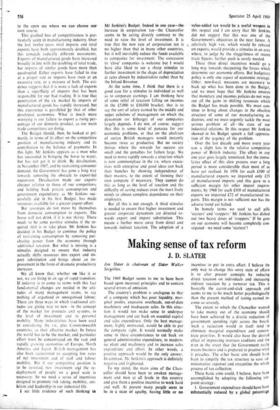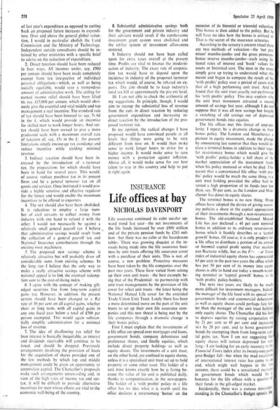Making sense of tax reform
J. D. SLATER
Jim Slater is chairman of Slater Walker Secrities.
The 1969 Budget seems to me to have been based upon incorrect principles and to contain several errors of omission.
The country's problem is analogous to that of a company which has poor liquidity, mar- ginal profits, excessive overheads, out-of-date machinery and inadequate sales. In this situa- tion it would not make sense to underpay management and cut back on essential capital and sales expenditure. Only the best manage- ment, highly motivated, would be able to put the company right. It would normally make sense in these circumstances to cut back on general administrative expenditure, to modern- ise plant and machinery and to increase sales expenditure and effort. In other words, a positive approach would be the only answer. In contrast, Mr Jenkins's approach is definitely negative and frightened.
To my mind, the main aims of the Chan- cellor should have been to awaken manage- ment and men at all levels in this country and give them a positive incentive to work hard and well. At present many people seem to be in a state- of apathy, having little or no
incentive to put in extra effort. I believe the only way to change this sorry state of affairs is to alter present concepts by reducing direct taxation on individuals and increasing indirect taxation by a turnover tax. This is basically the carrot-and-stick approach and seems to me to be much better psychologically than the present method of taxing earned in- come so severely.
The extent to which the Chancellor wanted to take money out of the economy should have been achieved by a drastic reduction of government spending right across the board. Such a reduction would in itself tend to eliminate marginal expenditure and concen- trate priorities. It would also have the desired effect of impressing overseas creditors and the man in the street that the Government really means business and is prepared to practise what it preaches. The o:her basic aim should have been to simplify the tax structure to save ad- ministrative expensd and streamline the whole process of tax collection.
These basic aims could, I believe, have been accomplished by adopting the following ten- point strategy :
1. Government expenditure should have been Substantially reduced by- a global yekcentage
of last year's expenditure as opposed to cutting back on proposed future increases in expendi- ture. Over and above the general global reduc- tion, I would in particular abolish the Land Commission and the Ministry of Technology. Independent outside consultants should be re- tained by other ministries with a specific brief to advise on the reduction of expenditure.
2. Direct taxation should have been reduced in four ways. All incomes under, say, £900 per annum should have been made completely exempt from tax irrespective of individual personal obligations—which, as well as being socially equitable, would save a tremendous amount of administrative work. The ceiling for earned income relief should have been lifted to, say. £15,000 per annum, which would obvi- ously give the essential and vital middle and top management a real incentive. The standard rate of tax should have been lowered to, say, 7s 6d in the £, which would provide an incentive for skilled men to work longer hours. And sur- tax should have been revised to give a more graduated scale with a maximum overall rate of taxation of, say, 15s in the £: the present limitations simply encourage tax avoidance and reduce incentive while yielding minimal revenue.
3. Indirect taxation should have been in- creased by the introduction of a turnover tax, the preparations for which should have been in hand for several years. This would. of course, replace purchase tax in its present form and be a general turnover tax on all goods and services. Once instituted it would pro- vide a highly sensitive and effective regulator for the future and would enable the maximum incentives to be offered to exporters
4. The SET should also have been abolished. It is ridiculous to employ a large num- ber of civil servants to collect money from industry with one hand to refund it with the other. I would not necessarily be against a relatively small general payroll tax. I believe that administrative savings would result from the collection of a general payroll tax and National Insurance contributions through the existing PAYE machinery.
5. The proposed new savings scheme is relatively attractive but will probably draw off considerable sums from existing schemes. In the long run• I believe that the only way to make a really attractive savings scheme with national appeal is to link the eventual redemp- tion sum to the cost-of-living index. '
6. I agree with the concept of making gilt- edged securities free from long-term capital gains tax. However, in addition, the present system should have been changed to a flat rate of 30 per cent on all capital gains, whether short or long term, with all capital gains in any one fiscal year below a total of £500 per person exempted. This would again substan- tially simplify administration for a minimal loss of revenue.
7. The idea of disallowing tax relief for loan interest is basically inequitable, as interest and dividends receivable will continue to be taxed, and should be dropped. Previously arrangements involving the provision of loans for the acquisition of shares provided one of the few methods by which top and middle management could be given an opportunity to accumulate capital. The Chancellor's proposals make such arrangements unrewarding and, in view of the high rates of income tax and sur- tax, it will be difficult to provide alternative incentives for men whose efforts are vital to the economic well-being of the country.
8. Substantial administrative savings both for the government and private industry and their advisers would result if the cumbersome investment grant system were abolished and the earlier system of investment allowances. restored.
9. Industry should not have been called upon for extra taxes overall at the present time. Profits are vital to finance the moderni- sation of industry. The exact rate of corpora- tion tax would have to depend upon the incidence in industry of the proposed turnover tax which would, of course, be rebated on ex- ports. The aim should be to keep industry's total tax bill at approximately the prevent level.
10. I am not able to check the arithmetic ok my suggestions. In principle, though, I would aim to recoup the substantial loss of revenue from the cuts in direct taxation by reducing government expenditure and increasing in- direct taxation by the introduction of the pro- posed turnover tax.
In my opinion, the radical changes I have proposed would have convinced people at all levels that things were going to be very different from now on. It would then make sense to work longer hours to strive for a higher income. It would make sense to save money with a protection against inflation. Above all, it would make sense for our best talent to stay in this country and help to put it right again.











































 Previous page
Previous page